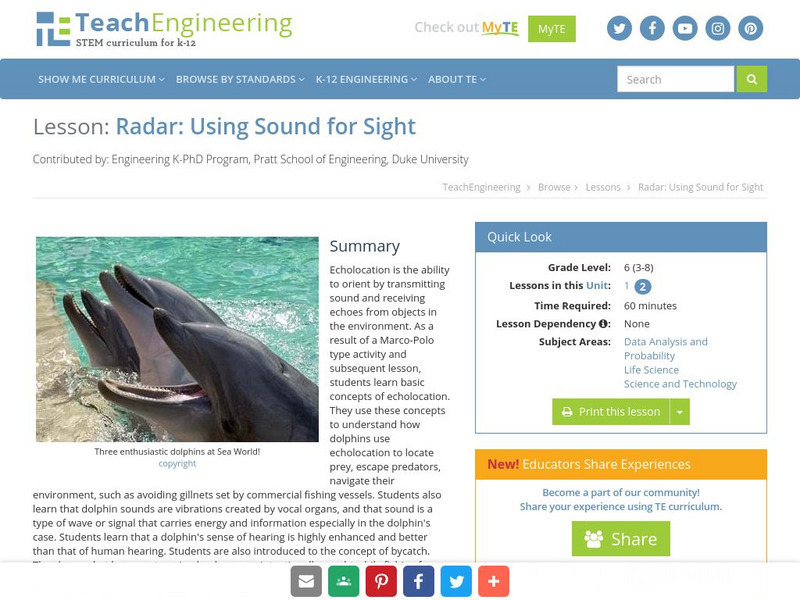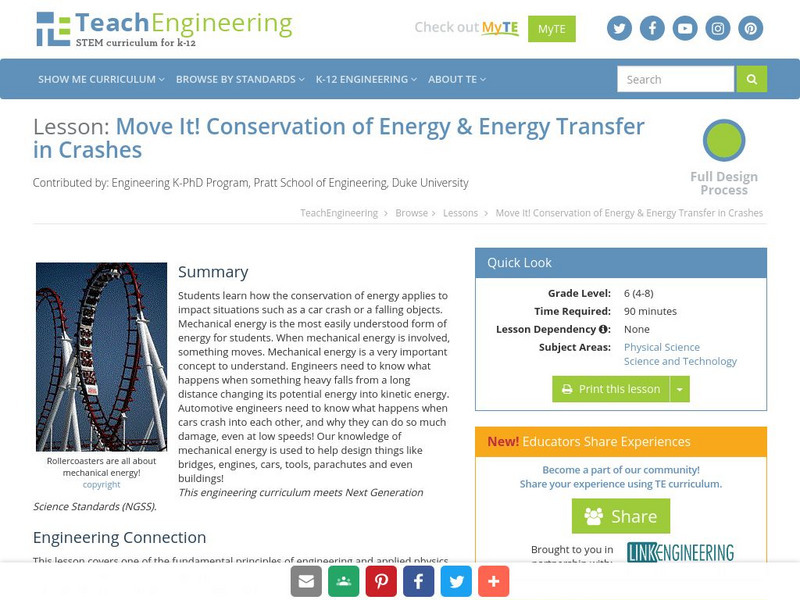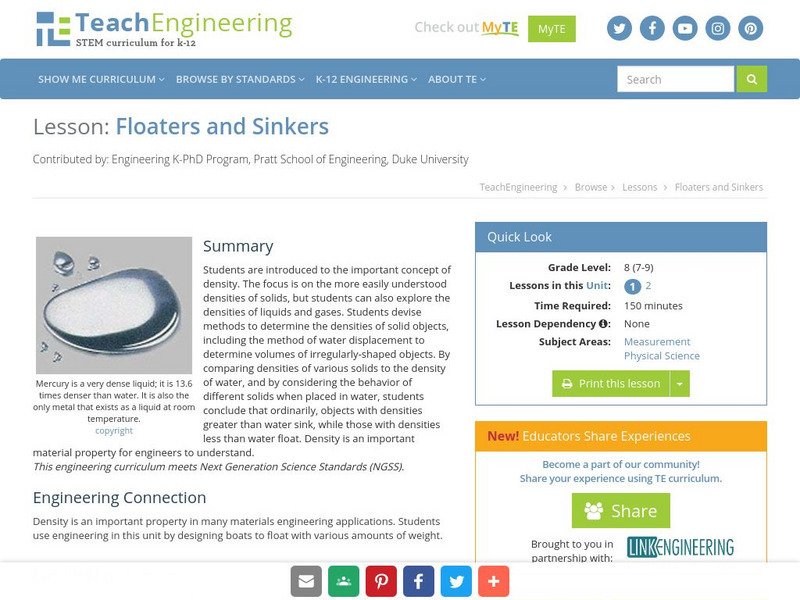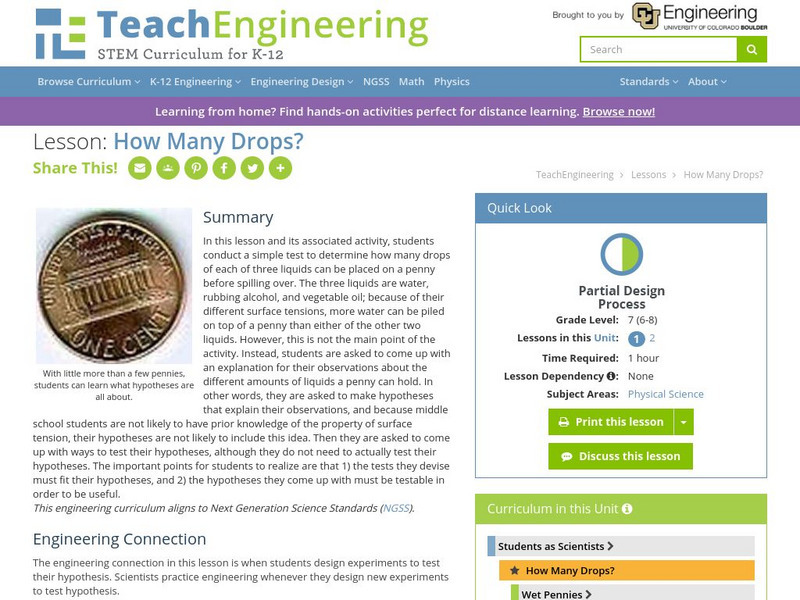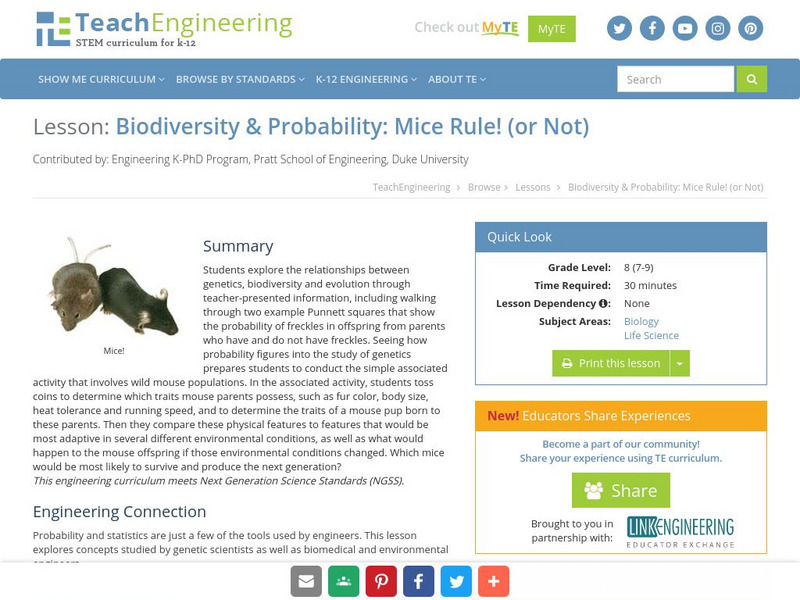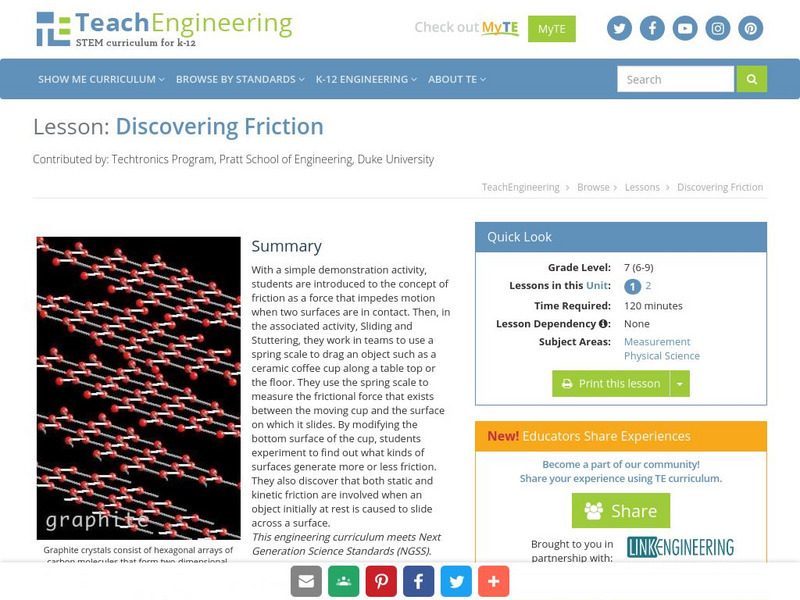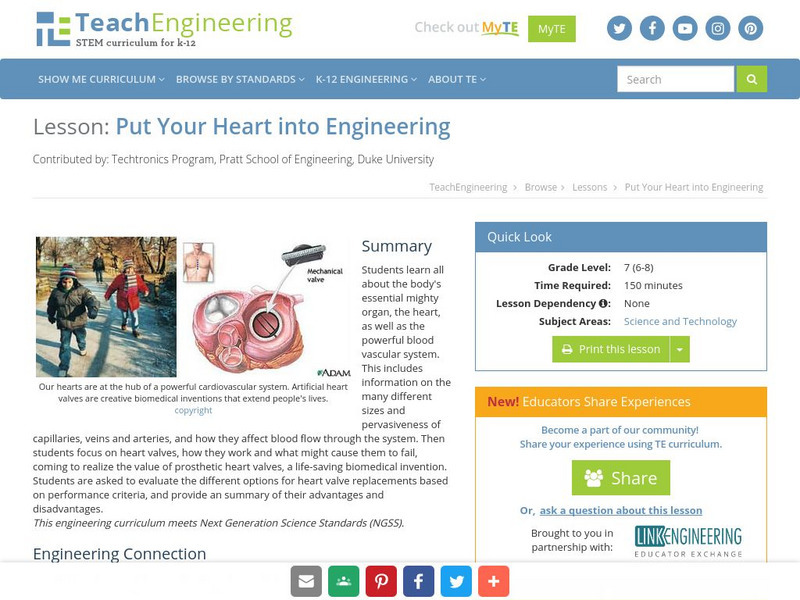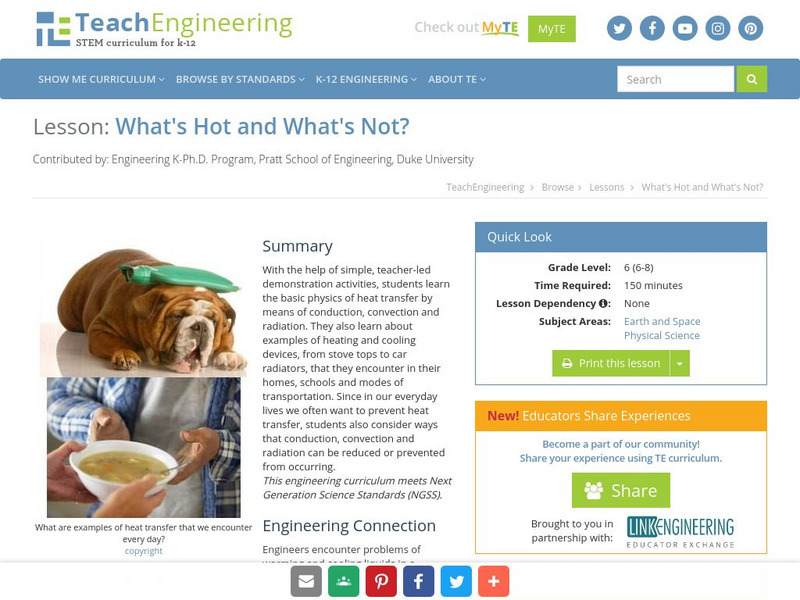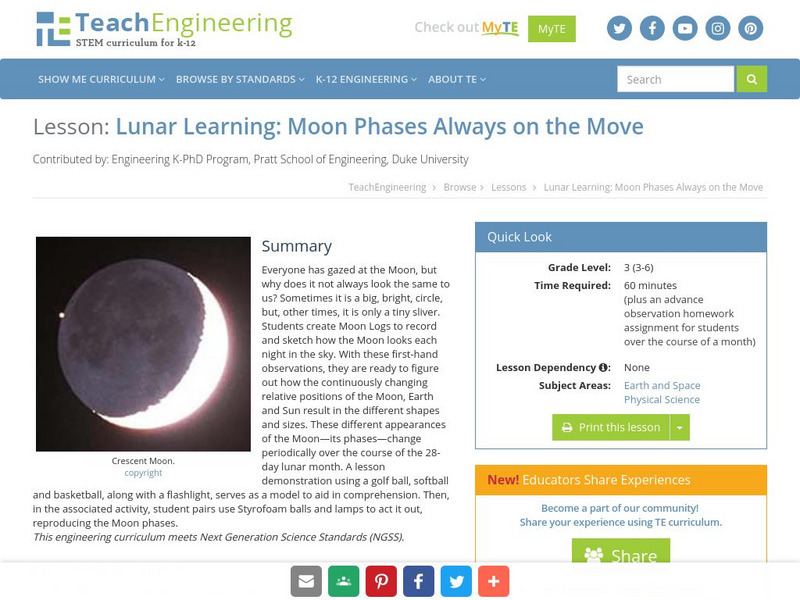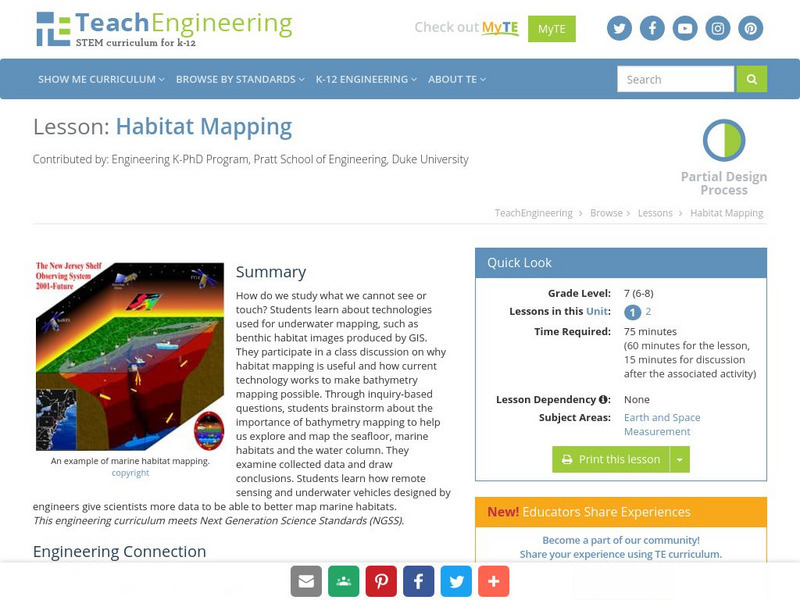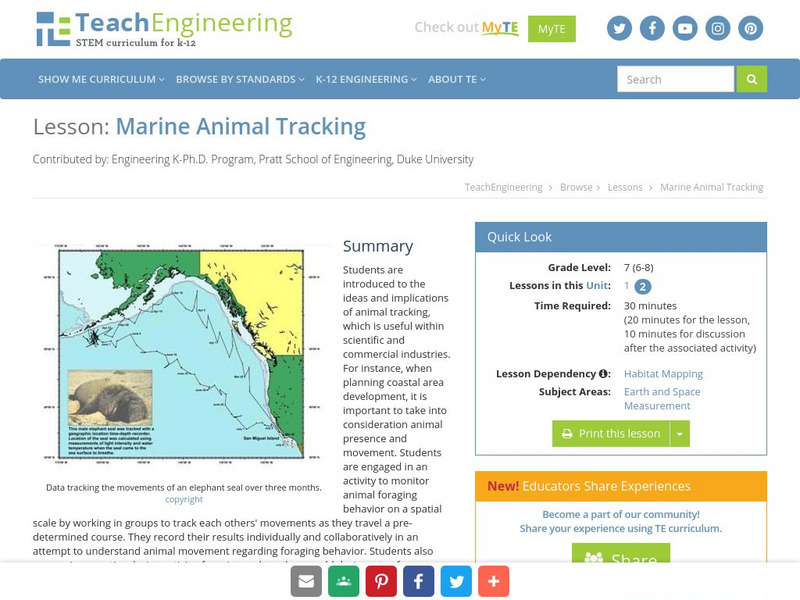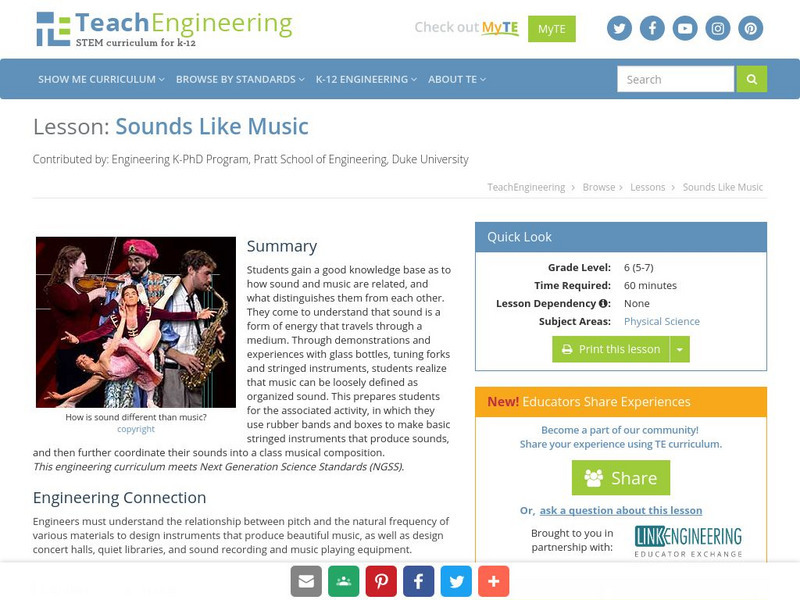TeachEngineering
Teach Engineering: Caught in the Net
Bycatch can be defined as the act of unintentionally catching certain living creatures using fishing gear. A bycatched species is distinguished from a target species (the animal the gear is intended to catch) because it is not sold or...
TeachEngineering
Teach Engineering: Sound for Sight
Echolocation is the ability to orient by transmitting sound and receiving echoes from objects in the environment. As a result of a Marco-Polo type activity and subsequent lesson, students learn basic concepts of echolocation. They use...
TeachEngineering
Teach Engineering: What Do Bread and Beer Have in Common?
Students are presented with information that will allow them to recognize that yeasts are unicellular organisms that are useful to humans. In fact, their usefulness is derived from the contrast between the way yeast cells and human cells...
TeachEngineering
Teach Engineering: Move It!
Mechanical energy is the most easily understood form of energy for young scholars. When there is mechanical energy involved, something moves. Mechanical energy is a very important concept to understand. Engineers need to know what...
TeachEngineering
Teach Engineering: Dirty Decomposers
Young scholars design and conduct experiments to determine what environmental factors favor decomposition by soil microbes. They use chunks of carrots for the materials to be decomposed, and their experiments are carried out in plastic...
TeachEngineering
Teach Engineering: Floaters and Sinkers
This lesson introduces students to the important concept of density. The focus is on the more easily understood densities of solids, but students can also explore the densities of liquids and gases. Students devise methods to determine...
TeachEngineering
Teach Engineering: How Many Drops?
In this lesson and its associated activity, students conduct a simple test to determine how many drops of each of three liquids can be placed on a penny before spilling over. The three liquids are water, rubbing alcohol, and vegetable...
TeachEngineering
Teach Engineering: Electrifying the World
This lesson introduces students to the fundamental concepts of electricity. This is accomplished by addressing questions such as "How is electricity generated," and "How is it used in every-day life?" The lesson also includes...
TeachEngineering
Teach Engineering: Energy Transfer in Musical Instruments
This instructional activity covers concepts of energy and energy transfer utilizing energy transfer in musical instruments as an example. More specifically, the instructional activity explains the two different ways in which energy can...
TeachEngineering
Teach Engineering: Mice Rule! (Or Not)
Students explore the relationships between genetics, biodiversity, and evolution through a simple activity involving hypothetical wild mouse populations. First, students toss coins to determine what traits a set of mouse parents...
TeachEngineering
Teach Engineering: What Floats Your Boat?
Students use modeling clay, a material that is denser than water and thus ordinarily sinks in water, to discover the principle of buoyancy. They begin by designing and building boats out of clay that will float in water, and then refine...
TeachEngineering
Teach Engineering: Fortified Breakfast
In this lesson, students will learn that minerals are a necessary part of our diet. They will learn that different minerals have different functions in the body. More specifically, they will discover that iron is necessary to carry...
TeachEngineering
Teach Engineering: Discovering Friction
With a simple demonstration activity, students are introduced to the concept of friction as a force that impedes motion when two surfaces are in contact. Then, in the Associated Activity (Sliding and Stuttering), they work in teams to...
TeachEngineering
Teach Engineering: Factors Affecting Friction
In this lesson, students use previous knowledge about friction to formulate hypotheses concerning the effects of weight and contact area on the amount of friction between two surfaces. In the Associated Activities (Does Weight Matter?...
TeachEngineering
Teach Engineering: What's Dominant?
In a class discussion format, the teacher presents background information about basic human genetics. The number of chromosomes in both body cells and egg and sperm cells is covered, as well as the concept of dominant and recessive...
TeachEngineering
Teach Engineering: Put Your Heart Into Engineering
This lesson contains background about the blood vascular system and the heart. Also, the different sizes of capillaries, veins, and arteries, and how they affect blood flow through the system. We will then proceed to talk about the...
TeachEngineering
Teach Engineering: What's Hot and What's Not?
With the help of simple, teacher-led demonstration activities, young scholars learn the basic physics of heat transfer by means of conduction, convection, and radiation. They also learn about examples of heating and cooling devices, from...
TeachEngineering
Teach Engineering: An Introduction to Inclined Planes
Students are introduced to the concept of simple tools and how they can make difficult or impossible tasks easier. They begin by investigating the properties of inclined planes and how implementing them can reduce the force necessary to...
TeachEngineering
Teach Engineering: Imagine Life Without Friction
Students are introduced to the concept of inertia and its application to a world without the force of friction acting on moving objects. When an object is in motion, friction tends to be the force that acts on this object to slow it down...
TeachEngineering
Teach Engineering: What Will Biodegrade?
Learners investigate what types of materials biodegrade in the soil, and learn what happens to their trash after they throw it away. The concepts of landfills and compost piles will be explained, and the students will have an opportunity...
TeachEngineering
Teach Engineering: Lunar Learning
Why does the Moon not always look the same to us? Sometimes it is a big, bright, circle, but, other times, it is only a tiny sliver, if we can see it at all. The different shapes and sizes of the slivers of the Moon are referred to as...
TeachEngineering
Teach Engineering: Habitat Mapping
The marine environment is unique and requires technologies that can use sound to gather information since there is little light underwater. In this lesson, the middle schoolers will be shown benthic habitat images produced by GIS. These...
TeachEngineering
Teach Engineering: Marine Animal Tracking
This lesson engages students in an activity to monitor animal foraging behavior on a spatial scale. The students will break into groups and track each other's movements as they move through a pre-determined course. The results will be...
TeachEngineering
Teach Engineering: Sounds Like Music
Music can loosely be defined as organized sound. The lesson objectives, understanding sound is a form of energy, understanding pitch, understanding sound traveling through a medium, and being able to separate music from sound, can...

